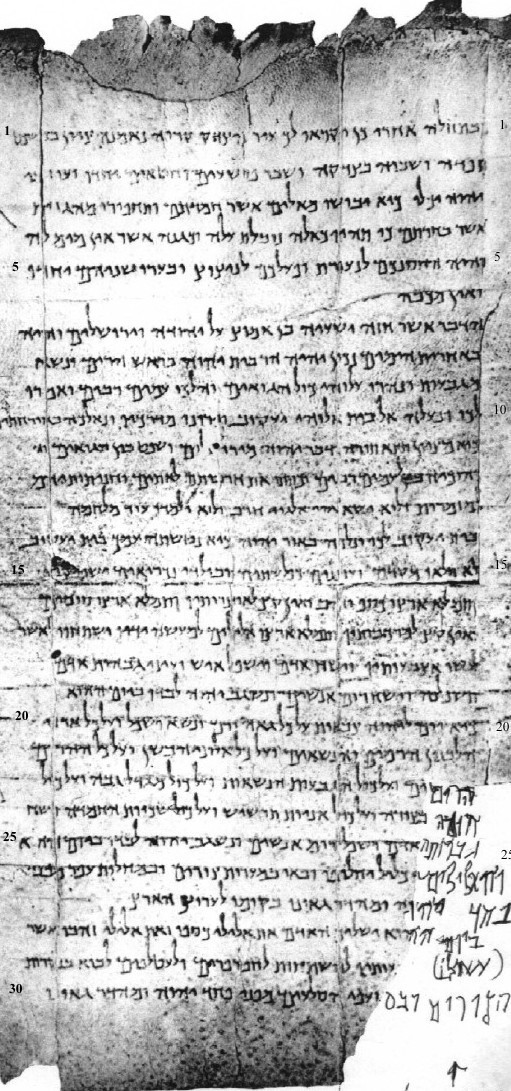Column II The Great Isaiah Scroll
1:26-2:21

Physical Condition:
This second page on the first strip of leather that makes up the scroll is in fair condition in spite of a lacuna and several creases and tears in the page. The tear at the left of the page associated with what could be the residual remains of a margin line extends the full length of the page. Two letters in the first two lines are obscured by this crease-tear. In line one a mem is barely visible in the word "be-mishpat" and in the 2nd line a beth is obscured in the word "ve-'ozavey" (forsakers of). There are some slight differences in this page and one radical omission of the last part of verse 9 and all of verse 10 and 3 words are missing from verse 2:2 in line 10 ("el har YHWH" to the mountain of YHWH) when the Q text is compared to the Masoretic or received text.
We have noted in the first Qumran Scroll page that there are superfluous waw's and yods and hes and alephs in Q which are aids to pronunciation and they indicate vowels. We will not continue to notice these but there are a considerable number occurring. But other differences between the Q and Masoretic text follow:
The first line on the page is mid way through verse 1:26. The fourth and fifth words in from the right are yiqra'u la-ke: (3mpl imp) + prep + 2fs suf (to you) and means "they shall call you." This differs from the Masoretic which has a niphal 3ms "yiq qare' la ke" meaning "it shall be called to you."
In verse 1:30 (4th line down last four words) Q reads "a'sher 'ayn mayiym lah" while the Masoretic reads "a'sher mayiym 'ayn lah." The meaning is the same.
In verse 1:31 (5th line) the second and fourth words (from the right) have 2mpl sufs, (kem) "your strong" and "your works" respectively. Masoretic has m-sing (the strong) for the first and a 3ms suf (worker of it).
Notice that the chapter division is marked by space being left to the end of the line after 1:31. Chapter two with the first word
ha-dabar begins a new line on line 7.Line 18: In verse 2:9 and verse 10: (12th line from the bottom) The fourth word from the left is "i'ysh" and is the last word in Q of verse 9. The Masoretic contains four more words (do not forgive them). Then the next word is the first word of verse 11 "aeyney" (eyes or looks). Thus verse 10 is omitted in its entirety. There seems to be an editor's mark above the last word (adam) in this line. Perhaps this is a note to mark the omission.
Line 19: In verse 11 (first word in line 11 from bottom in Masoretic is "shaphal," a pf. 3ms verb (fall) the same word in Q in this place is slightly obliterated but careful reconstruction is possible and it may be hishapalnah which is a 5th stem hifiel verb 2fpl or 3fpl. or "tishpalnah" a 1st or 2nd stem imp 3fp, either means they (fem) are made to fall .
From verses 14 to 21 There is a word missing at the beginning of each line from the 8th from the bottom to the last line.. The word missing in verse 14 is part of the word "haromiyim" (harom is missing) the next line has "chomah" in the lacuna. The 6th from the bottom is missing the article "ha" on the second word as well as "gabruth" in verse 17. The 5th line lacuna contains the word "ve-ha-'aliyliym." The fourth from the bottom should contain "phachad" (or pakad) and the "yhw" of the YHWH. The third line lacuna is the first two words of verse 20: "be-yom ha-hu'" (the be-yom h is missing). The line 2 lacuna is missing 'asu-lo (they made it) but there is further complication as the first word following the lacuna has part of a superfluous word not in the Masoretic while the rest of verse follows word for word. The last line is in verse 21 where the lacuna should have ha-tsuriym + ubis.. of the word ubisiy'phiy.
Another item to note is the space at the end of verse 19 to mark a paragraph. This is line 4 from the bottom
Other Variations in Q from the Masoretic:
Line 1: 4th word: Q = "yiqra' u" imp 3mpl (they shall
call)
and M = "yiqra' " 2nd stem 3ms (you shall be called).
Line 5: 2mpl. suffixes (kem) are added to words 2 and
4 which
do not have them in the received text.
Line 10 after the 3rd word: 3 words are omitted from Q
which are in M (to the mountain of YHWH) "'el har YHWH"
Line 12: 2nd word: An extra word in Q not in M = "beyn"
(among)
Line 21 3rd word: this is a good example of a poorly written "he" which looks like and aleph. Scroll up to see this. Manuscript "he" being mistaken for aleph is probably the answer to the supposed Aramaic
word in Isaiah 63. After looking you be the judge and see if the letters do or do not look the same.